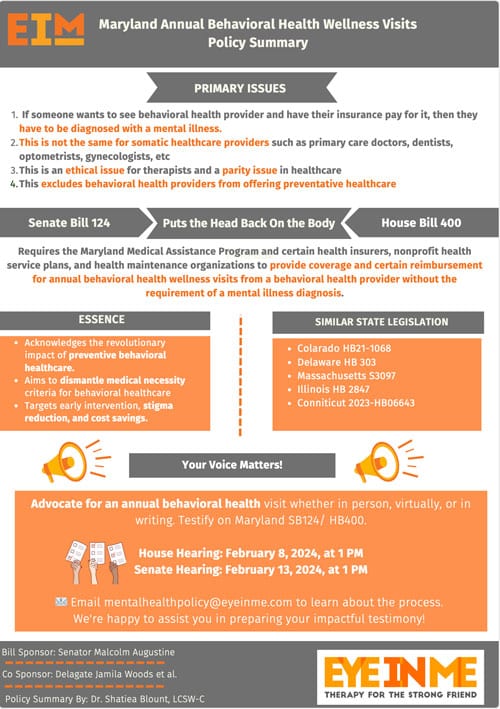Policy Advocacy
Maryland Annual Behavioral Health Visit

PCP screenings may miss nuanced aspects of mental health. Behavioral health practitioners, through comprehensive assessments, can capture subtleties, contributing to a more accurate understanding of an individual’s mental health and well-being.
Primary care doctors may screen for mental health concerns, but they are not specialized behavioral health providers. SB124 and HB400 emphasize the role of licensed behavioral health professionals for comprehensive assessments and care planning.
Prevention involves proactively addressing mental health to avoid the development of conditions, while treatment focuses on managing and mitigating existing behavioral health conditions.
Behavioral health providers can be both specialists, focusing on specific areas, and generalists, off ering a broad range of services. SB124 and HB400 recognize and support the diverse roles within the behavioral health field.
Insurance may recognize a provisional or preliminary diagnosis, but the bills advocate for avoiding premature diagnoses until a thorough assessment confirms a condition.
A symptom is an observable sign, while a diagnosis is a formal identification of a specific behavioral health condition based on a comprehensive assessment. It’s important to note that one can experience symptoms, such as anxiety or narcissistic traits, without necessarily having a formal diagnosis of anxiety or Narcissistic Personality Disorder.
A screening is a brief check to identify potential concerns, while an assessment is an in-depth evaluation conducted by licensed professionals to diagnose specifi c behavioral health conditions. Assessments involve detailed questioning, observation, and standardized tools to identify and diagnose behavioral health conditions.
These bills aim to ensure annual coverage for behavioral health visits, promoting mental health parity and prevention.

